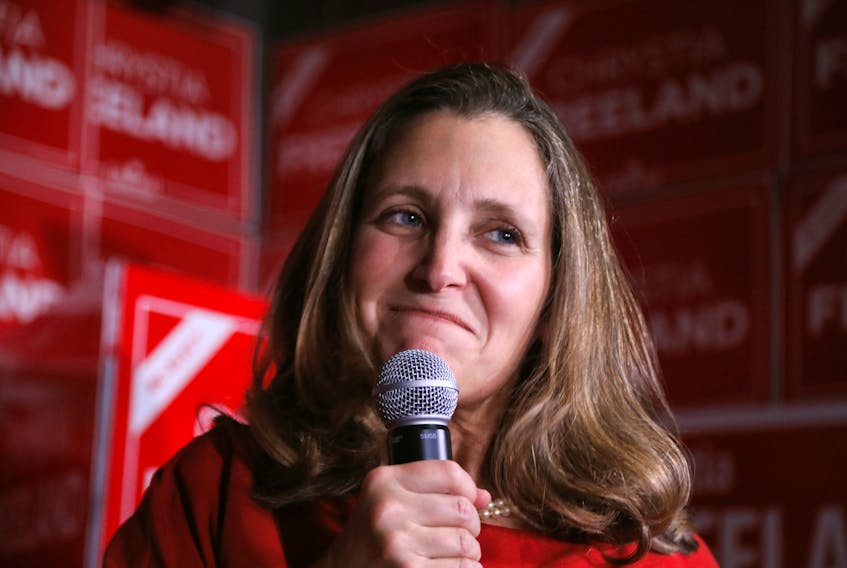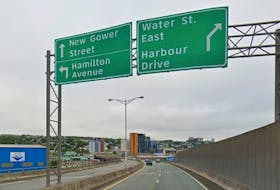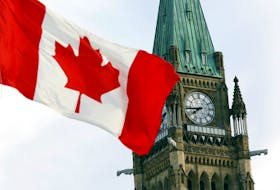OTTAWA, Ont. — Earlier this week, protesters briefly blocked Deputy Prime Minister Chrystia Freeland’s entrance to Halifax City Hall where she was meeting with Mayor Mike Savage.
Seemingly unperturbed, Freeland pushed past the crowd who were acting in solidarity with Wet'suwet'en hereditary chiefs and others across the country in protesting the building of the Coastal Gaslink pipeline through traditional and unceded First Nations territory in B.C.
Breaking: Chrystia Freeland blocked at both doors from entering city hall until she addresses the war and occupation of #Wetsuweten territory#WetsuwetenSolidarity #Unistoten #WetsuwetenStrong #ShutDownCanada #ShutCanadaDown pic.twitter.com/aSk6wDgb3r
— Sakura Saunders (@sakura1979) February 12, 2020
While many had opinions on Freeland’s actions and whether or not pushing through peaceful protesters was a good move, some also questioned how Canada’s deputy prime minister got so close to protesters and why she had no security detail to speak of.
ICYMI: Yesterday, supporters of Wet’suwet'en land defenders disrupted Freeland’s visit to #Halifax with this message:
— Stacey Gomez (@staceyjgomez) February 13, 2020
“It’s your responsibility as the Deputy Prime Minister to address the crisis & the war on Wet’suwet'en territory“#ShutDownCanada #WetsuwetenStrong #NSPoli pic.twitter.com/JekaL9ux3D

According to Dalhousie political sociologist Howard Ramos, cabinet ministers in Canada, a category that includes the deputy PM, rarely get any form of security.
“I think that in general, it's very Canadian that most ministers don't have a security detail and this is something that makes something Canada quite distinct,” Ramos said.
“The Canadian political system is based on openness and access and even with you look at the prime minister in comparison to other world leaders access ... Most prime ministers usually do wade into crowds and do make public appearances without a huge protocol or bulletproof glass or big SUVs.”
Ramos said this promotes a kind of cultural openness in Canada and recognizes one of the roles of politicians is to be accessible and accountable to the public.
VIDEO: Wet’suwet’en solidarity action targets Deputy PM Chrystia Freeland on her visit to Halifax, demanding that she speak to the war on and occupation of #Wetsuweten territory
— Sakura Saunders (@sakura1979) February 12, 2020
“There is nothing more important for you to be talking about”#ShutdownCanada #wetsuwetenstrong pic.twitter.com/vl5veF87XL
The RCMP’s Protective Policing Services is officially responsible for the personal protection of the governor-general of Canada, the prime minister, their families and residences as well as for the safety of Supreme and Federal Court judges and federal cabinet ministers.
But other than the prime minister, who has near-constant security detail, cabinet ministers rarely have any sort of security. A notable exception is former Environment minister Catherine McKenna after repeated sexist and hateful comments and threats caused some concern about her safety.
Some people will applaud her for pushing through (and) condemn the protesters for blocking her way, other people will condemn her for pushing through the protesters,
- Howard Ramos
Freeland’s safety was not clearly endangered by the Halifax protesters, but since it’s been quite a while since Canada has a deputy prime minister — the last was Anne McLellan under Paul Martin — Ramos said how her office will handle the security question going forward remains to be seen.
“We’re in uncharted territory where policy is being rethought about what the role is and what are the security protocols,” he said.
As for Freeland’s decision to stand her ground amidst protests, Ramos said it was a conscious choice for her — she could have postponed the meeting or changed locations — and the public will read into it what they want.
“Some people will applaud her for pushing through (and) condemn the protesters for blocking her way, other people will condemn her for pushing through the protesters,” he said.
“It certainly speaks to her tenacity and her belief that there's a right to protest and there's also a right for her to do her work.”
Freeland’s office would not comment on security measures.









